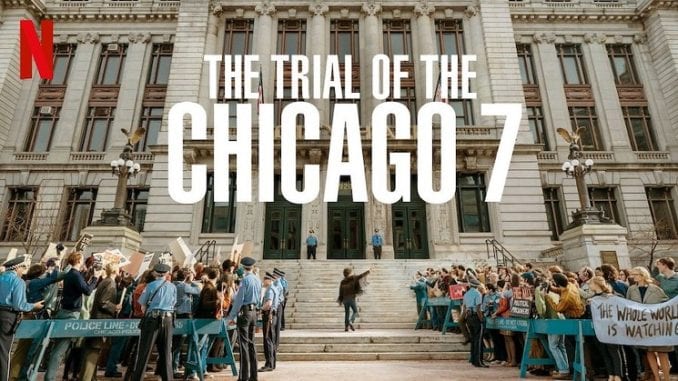
Netflix’s historical film The Trial of the Chicago 7 has garnered six Oscar nominations including Best Picture And Best Original Screenplay. The movie was met with critical acclaim at the time of its October 2020 release on the streaming platform, but what is all the hype about?
Set against the politically tense backdrop of the late 1960s, the Trial of the Chicago 7 tells the story of eight near-strangers who were among the thousands gathered in Chicago in the spring of 1968 to protest against the Vietnam War. The protest turned violent, and in the following months, these eight individuals were charged under the Rap Brown Act, for conspiracy to riot. The film follows the group through the months of the trial, with viewers learning more about the characters and the events that lead to the riot as the movie progresses.
In this way, Chicago 7 already succeeds where many other films based on true events and legal dramas fail, as it manages to keep viewers engaged throughout a long trial filled with court scenes and legal jargon. It is here that director and writer Aaron Sorkin earns his Best Original Screenplay nomination.The movie is very well paced, and the court scenes are broken up into palatable pieces that don’t bore the audience. Whether they are laughing at the frequent interruptions of court proceedings, screaming in indignation at the judge’s blatant bias, or intently analyzing the flashbacks of the protest to piece together the truth, the audience is altogether unable to look away.
The film also does a great job highlighting the differences in personality and ideology of the different characters, as opposed to grouping them together as a general group of ‘hippie leftists’, as history too often does. The result is a highly realistic – if not always complex- cast of characters that audiences can relate to and root for. However, while certain characters like Abbie Hoffman and Tom Hayden are given a real spotlight, others are sidelined as ‘other members’ of the group, with few lines and major contributions. A single critique of the movie would be that it fails to give each of the individuals on trial a fair amount of attention. While I accept that Sorkin was confined to a time-limit, and that giving every character complex arcs and detailed backstories is not feasible, I still got the impression that some characters were too obviously put in the story as placeholders, and did little else, making them flat and ultimately unmemorable to the viewer. However, the characters who were given the opportunity to shine fulfilled their roles with great success. Sacha Cohen Baron’s portrayal of the brazen, but wise, Abbie Hoffman was so powerful it earned him an Oscar nomination.
Personally, the most compelling part of this movie wasn’t directly related to the cinematography or script at all (although both are exceptional), it was the ethical and contemplative questions it forced me to consider in a new light. This movie made me ask myself, as I have a few times in the past year, what freedom of speech, freedom of assembly, and freedom itself really means? It made me consider the terrifying parallels between how protesters were treated in 1968 and how they were treated in 2020, and forced me to examine how progress is viewed and brought about in our society. For me, this is the true measure of any ‘amazing’ film, that it has themes that relate to society today, and ultimately prompts reflection from the audience.
The Verdict: I personally loved the movie, and I think the hype and accolades are rightfully deserved. I rate it an 8.5/10 because I recognize the film plays it safe in many regards, and I had some issues with certain plot points and character arcs.
Recommended for: If you like legal and historical dramas, or movies with a greater social theme, this is for you! I’d recommend it to fans of When They See Us, Suits, The Social Network, or The Big Short
If you decide to give it a watch please share your thoughts. I’d love to know what you all think!
